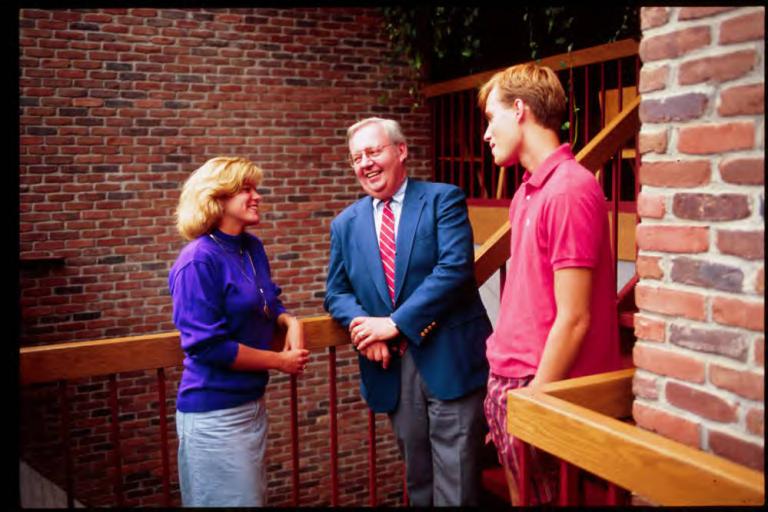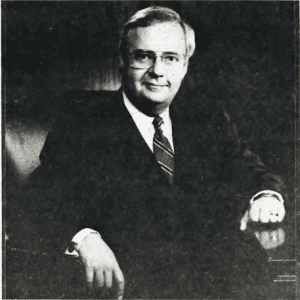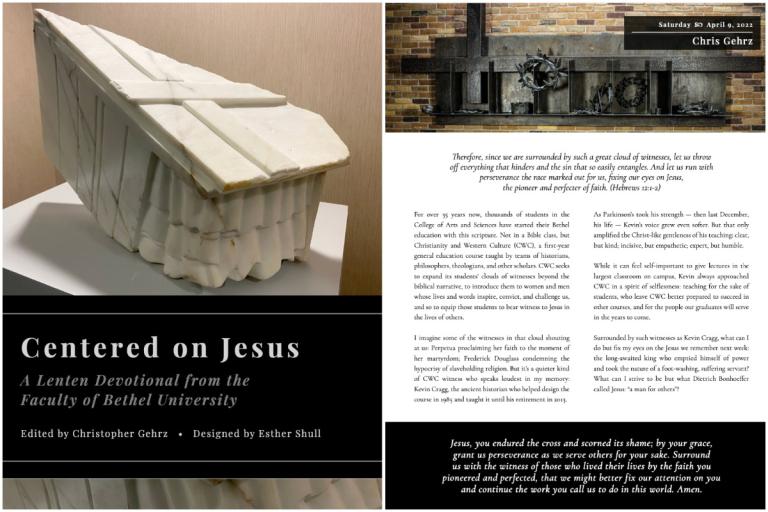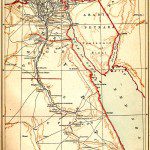As I did four years ago, let me pause before Ash Wednesday to share with readers a free daily devotional I’ve edited, for use during the season of Lent and Holy Week. But first, let me offer some historical context for this particular booklet…

On Sunday afternoon the people of Bethel University and its denomination gathered to pay tribute to George K. Brushaber, who died before Christmas at age 82. One of the most significant, yet lesser-known leaders of late 20th century evangelicalism, George was not just the president of Bethel for over a quarter-century (1982-2008) and a leader within Christian colleges and seminaries more generally, but the founding editor of Christian Scholar’s Review and executive editor of Christianity Today in the 1980s.
Despite taking presidential office in the middle of Bethel’s worst enrollment crisis since the world wars, George didn’t seem to consider the possibility of broadening Bethel’s mission or diluting its religious identity. In his first report to the Baptist General Conference, he emphasized that “there is a thorough-going pervasiveness of Christ’s presence in all that we do: in administrative councils, student advising sessions, classroom lectures, and basketball games. The Lord is here. May He grant that it ever be so.”
A pastor’s kid and pastor himself before he became dean at Westmont College, George was at least as interested in the future of seminaries as any other aspect of postsecondary education. But he wanted Bethel to prepare “competent and committed Christians who will bear a strategic influence for Christ within all the structures of society” — not just the church itself. To that end, he oversaw — as college dean from 1975-1982, then as Carl Lundquist’s successor as president — the creation of Bethel’s undergraduate majors in business, social work, and nursing and (in the 1990s) the launch of our adult and graduate programs.

But as much as Bethel’s connection to the church and its mission made George ready to innovate in response to a changing context, there were compromises he wouldn’t make. In a 1988 Christianity Today article, George lamented that the institutions of American evangelicalism had “become more affluent and success oriented, according to the secular world’s definition of success.” That could include educational institutions, whose Christian students increasingly, like their national peers, saw college primarily as a means to material ends rather than intellectual and spiritual growth. (The same article also quotes George’s eventual successor as Bethel president, Jay Barnes, then head of student life at Messiah College.)
To his great credit, George refused to pit Bethel’s religious identity — or its bottom line — against its commitment to academic excellence and the liberal arts. He may have inaugurated more professional majors, but programs like computer science, physics, art, and philosophy also started or grew during his tenure. Remarkably, over half of our full-time faculty still trace their hire to the Brushaber presidency, nearly fourteen years after it ended.
While Jesus was present in administrative planning and basketball games, plus chapel services and dorm life, none of those activities could substitute for the teaching and learning facilitated by Bethel’s faculty and curriculum. (Much of general education in the College of Arts and Sciences still stems from a review that George encouraged early in his presidency.) The holder of a PhD in epistemology and metaphysics from Boston University, George had edited Christian Scholar’s Review out of his conviction that “the Christian faith can serve as a catalyst by which the fragmented fields of learning are unified into a comprehensive view of man, his world, and God.” In a column near the end of his editorial tenure at Christianity Today, he described several distinct educational strengths of the Christian college that resulted from — not in spite of — its commitment to Christ. Most striking was his first argument:
…the Christian college can enjoy a greater measure of academic freedom than its secular counterparts precisely because faith is explicitly viewed as a legitimate aspect of curriculum, instruction, and research. The field of study is broader, not narrower. Matters of faith need not be excluded a priori from the classroom, and religious assumptions and values can be treated with the integrity and importance they deserve. For the Christian college, competing ideologies merit respectful, even empathetic, scrutiny. Precisely because a college is Christian it eschews ad hominen [sic] treatment of other views and resists demands that it engage in mere indoctrination.
And George was ready to defend that “greater measure of academic freedom” against constituents who would have preferred something closer to “mere indoctrination.” Most famously, in the 1990s he defended Bethel English professors against a lawsuit by parents who were upset that their child had had to read The Invisible Man and watch scenes from Do the Right Thing and The Tin Drum.
But even from my relatively brief acquaintance with George (I came to Bethel five years before his retirement), I knew that his commitment to academic excellence, breadth, and freedom within a religious setting like ours was no small source of stress. In almost twenty years in Christian higher ed, I’m both more convinced that he’s right about the Christian college and more empathetic to administrators who sometimes struggle to explain what’s “Christ-centered” to constituents who don’t always understand that faculty want to push their students through free inquiry and critical thinking to “make their faith their own.”
Which leads me back to where I started this post… Inspired by Biola University’s Advent Project, I approached our faculty in early January with the proposal that we work together to edit a Lenten devotional: a free online booklet that we would give away to students, parents, alumni, donors, churches, and anyone else who might benefit from such a resource. The result is Centered on Jesus: A Lenten Devotional from the Faculty of Bethel University, now available for free download.
About four dozen professors, librarians, campus pastors, and administrators signed up to write short biblical reflections and prayers that would touch on traditional themes of the season (e.g., contemplation, repentance, spiritual disciplines, salvation). But we also sought to share what being “centered on Jesus” means for our academic disciplines (over twenty of them). If you spend the next weeks reading and praying with us, you’ll learn what Jesus has to do with the writing of Dante and Augustine and why it’s “Christ-like and holy” to serve as a social worker. You’ll learn how a biologist heard Christ’s call in a tropical rain forest and why a political scientist thinks that the king acclaimed on Palm Sunday and crucified days later overturns our standard notions of political power. You’ll hear the gospel set to the music of northeastern India and the words of Hebrew scriptures, and you’ll see Jesus differently, through the sculpture of longtime Bethel art professor Stewart Luckman and a selection of photos taken by students and faculty while studying abroad.
In the broadest sense, I meant Centered on Jesus to mark Bethel’s 150 anniversary. But I’m particularly glad that the release of that devotional has also coincided with our celebration of the life and legacy of George Brushaber, who lived out his predecessor’s belief that “Truth and Christ are one, and the important thing about Truth is that it ought to point to Christ.”
Click here to download the devotional, and please feel free to share it with anyone else who might be interested.














